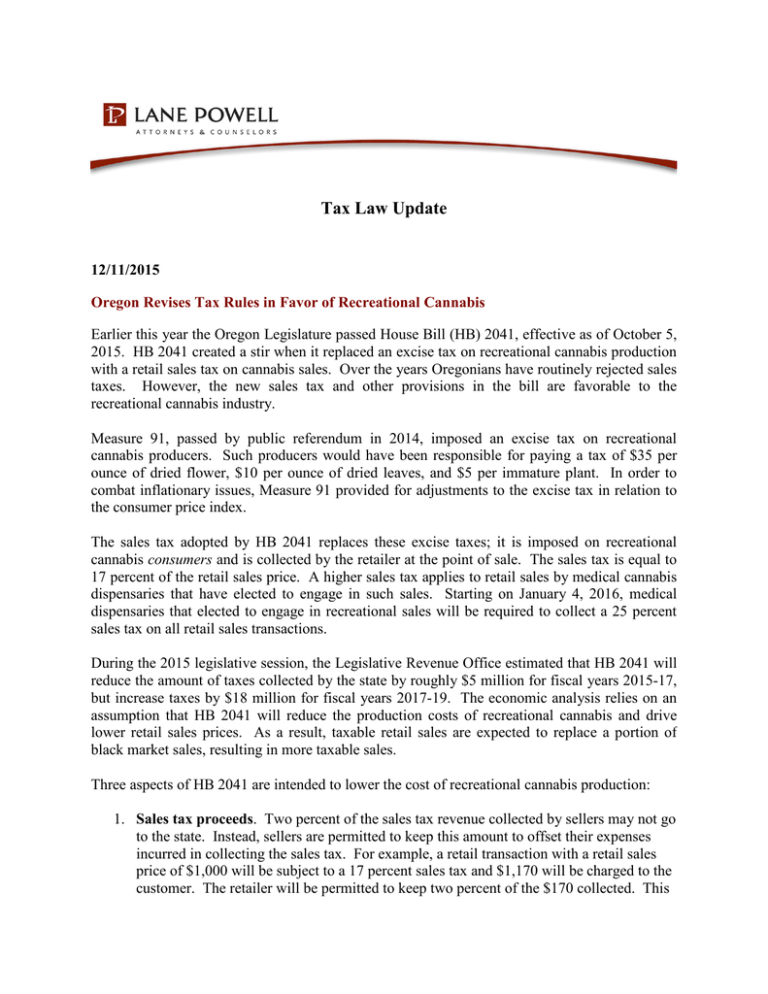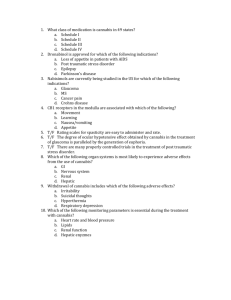Tax Law Update
advertisement

Tax Law Update 12/11/2015 Oregon Revises Tax Rules in Favor of Recreational Cannabis Earlier this year the Oregon Legislature passed House Bill (HB) 2041, effective as of October 5, 2015. HB 2041 created a stir when it replaced an excise tax on recreational cannabis production with a retail sales tax on cannabis sales. Over the years Oregonians have routinely rejected sales taxes. However, the new sales tax and other provisions in the bill are favorable to the recreational cannabis industry. Measure 91, passed by public referendum in 2014, imposed an excise tax on recreational cannabis producers. Such producers would have been responsible for paying a tax of $35 per ounce of dried flower, $10 per ounce of dried leaves, and $5 per immature plant. In order to combat inflationary issues, Measure 91 provided for adjustments to the excise tax in relation to the consumer price index. The sales tax adopted by HB 2041 replaces these excise taxes; it is imposed on recreational cannabis consumers and is collected by the retailer at the point of sale. The sales tax is equal to 17 percent of the retail sales price. A higher sales tax applies to retail sales by medical cannabis dispensaries that have elected to engage in such sales. Starting on January 4, 2016, medical dispensaries that elected to engage in recreational sales will be required to collect a 25 percent sales tax on all retail sales transactions. During the 2015 legislative session, the Legislative Revenue Office estimated that HB 2041 will reduce the amount of taxes collected by the state by roughly $5 million for fiscal years 2015-17, but increase taxes by $18 million for fiscal years 2017-19. The economic analysis relies on an assumption that HB 2041 will reduce the production costs of recreational cannabis and drive lower retail sales prices. As a result, taxable retail sales are expected to replace a portion of black market sales, resulting in more taxable sales. Three aspects of HB 2041 are intended to lower the cost of recreational cannabis production: 1. Sales tax proceeds. Two percent of the sales tax revenue collected by sellers may not go to the state. Instead, sellers are permitted to keep this amount to offset their expenses incurred in collecting the sales tax. For example, a retail transaction with a retail sales price of $1,000 will be subject to a 17 percent sales tax and $1,170 will be charged to the customer. The retailer will be permitted to keep two percent of the $170 collected. This amounts to $3.40 or 0.34 percent of the retail sales price. For transactions subject to the 25 percent sales tax, the retailer will be permitted to keep 0.5 percent of the retail sales price or $5 in the example above. The excise tax originally enacted as part of Measure 91 did not provide any compensation for compliance costs. Tax forms related to the sales tax have not yet been released and it is not clear how obvious the ability to retain a portion of the sales tax proceeds on the returns will be. 2. Sales tax imposed on consumer. For U.S. federal income tax purposes, IRC § 280E denies tax deductions for businesses that “traffic” Schedule I or Schedule II controlled substances as defined in the Controlled Substances Act. As a result, businesses that engage in cannabis sales are generally subject to U.S. federal income tax on their gross profits. Under IRC § 280E, the excise taxes originally imposed under Measure 91 likely would not have been deductible for U.S. federal income tax purposes. Since the new sales tax imposed by HB 2041 is paid directly by retail consumers, the “tax portion” of what they pay never becomes part of the seller’s taxable income. While it is not entirely certain, the two percent portion of the sales tax that is retained by the retailer is likely included in the seller’s income and any expenses incurred collecting sales taxes may not be deductible due to IRC § 280E. 3. Decoupling from IRC § 280E. Taxable income for Oregon state income tax purposes is based on U.S. federal taxable income, with modifications expressly adopted by the Legislature. HB 2041 adopted ORS 316.680(i), allows taxpayers, solely for Oregon income tax purposes, to deduct from federal taxable income “any federal deduction that the taxpayer would have been allowed for the production, processing or sale of marijuana items … but for section 280E.” This change should dramatically reduce the Oregon state income tax burden imposed on recreational cannabis businesses. For more information, please contact the Tax Law Practice Group at Lane Powell: lanepowellpc@lanepowell.com This is intended to be a source of general information, not an opinion or legal advice on any specific situation, and does not create an attorney-client relationship with our readers. If you would like more information regarding whether we may assist you in any particular matter, please contact one of our lawyers, using care not to provide us any confidential information until we have notified you in writing that there are no conflicts of interest and that we have agreed to represent you on the specific matter that is the subject of your inquiry. Copyright © 2015 Lane Powell PC Seattle | Portland | Anchorage | Tacoma | London 2




